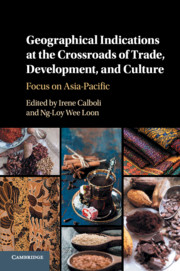Geographical Indications at the Crossroads of Trade, Development, and Culture
Historically, few topics have proven to be so controversial in international intellectual property as the protection of geographical indications (GIs). The adoption of TRIPS in 1994 did not resolve disagreements, and countries worldwide continue to quarrel today as to the nature, the scope, and the enforcement of GI protection nationally and internationally. Thus far, however, there is little literature addressing GI protection from the point of view of the Asia-Pacific region, even though countries in this region have actively discussed the topic and in several instances have promoted GIs as a mechanism to foster local development and safeguard local culture. This book, edited by renowned intellectual property scholars, fills the void in the current literature and offers a variety of contributions focusing on the framework and effects of GI protection in the Asia-Pacific region. The book is available Open Access at http://dx.doi.org/10.1017/9781316711002.
Irene Calboli is Lee Kong Chian Fellow, Visiting Professor, and Deputy Director of the Applied Research Centre for Intellectual Assets and the Law in Asia (ARCIALA), School of Law, Singapore Management University. She is also Professor of Law at Texas A&M University School of Law and Transatlantic Technology Law Forum Fellow at Stanford Law School. An elected member of the American Law Institute, she has written extensively on the topic of geographical indications (GIs) and has acted as Expert on GIs for the World Intellectual Property Organization and the European Union Intellectual Property Office.
Ng-Loy Wee Loon is Professor at the Faculty of Law of the National University of Singapore. Her publications include the textbook on the Law of Intellectual Property of Singapore (2nd ed. 2014). She was the Founding Deputy Director at the Intellectual Property Academy of Singapore, and is currently a member of the Singapore’s Copyright Tribunal and of the Singapore Domain Name Dispute Resolution Policy Panel. She is also Senior Counsel (honoris causa) (an appointment made by Singapore’s Court of Appeal and Attorney-General).
